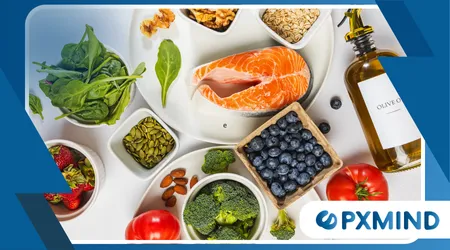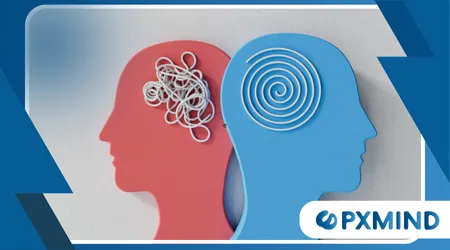The Link Between Nutrition and Mental Health

The intricate Link Between Nutrition and Mental Health is one of the most compelling and often overlooked aspects of modern well-being.
Anúncios
We’re taught to fuel our bodies for physical performance, but rarely do we consider the profound impact of our diet on our cognitive function and emotional resilience.
This isn’t just about avoiding a sugar crash; it’s about a direct, biological conversation between your gut and your brain.
The Gut-Brain Axis: A Two-Way Street
Think of your gut and brain as two best friends, constantly texting each other. The gut, with its trillions of bacteria, is a bustling metropolis of activity.
It’s home to the gut microbiome, which produces a staggering number of neurotransmitters—including most of the body’s serotonin, the “happy hormone.”
What you eat directly influences the composition of this microbiome.
A diet rich in processed foods and sugar can lead to an imbalance, creating a less-than-ideal environment. This microbial imbalance, or dysbiosis, can interfere with the production of key brain chemicals.
On the flip side, a diet full of fiber-rich plants, fermented foods, and healthy fats nurtures a diverse and thriving community of beneficial bacteria.
This, in turn, supports the continuous and efficient flow of essential neurotransmitters.
Beyond the Microbiome: Key Nutrients and Their Role
While the gut-brain axis is a major player, specific nutrients also act as building blocks for brain health.
These aren’t just empty calories; they’re the fuel your mind runs on. Deficiencies in these key nutrients can significantly impact your mental state.
Read more: Digital Detox: Why Your Brain Needs It
For instance, a lack of B vitamins can lead to fatigue, irritability, and even depression, as they are crucial for energy metabolism and the synthesis of neurotransmitters.
Magnesium, an essential mineral, plays a role in over 300 biochemical reactions in the body, many of which are directly related to brain function and mood regulation.
A deficiency in magnesium has been linked to increased anxiety and stress, making it a critical nutrient to monitor. This demonstrates a clear Link Between Nutrition and Mental Health.

The Omega-3 Effect: Fuel for Cognitive Function
One of the most powerful examples of diet’s influence is the role of omega-3 fatty acids.
Found in fatty fish, walnuts, and flaxseeds, these are essential fats that the body cannot produce on its own.
They are vital components of brain cell membranes and are known for their anti-inflammatory properties.
Check this out: How Nature Walks Improve Your Mental
Chronic inflammation is a silent contributor to many mental health disorders, including depression and anxiety.
By reducing this inflammation, omega-3s help maintain a healthy environment for brain cells to thrive.
In fact, a 2017 study published in the journal Translational Psychiatry found that individuals with major depressive disorder who supplemented with EPA (eicosapentaenoic acid), a type of omega-3, showed a significant reduction in depressive symptoms compared to a placebo group.
This is a powerful testament to the tangible benefits of incorporating these healthy fats into your diet.
From the Plate to the Mind
Let’s bring this to life with two examples. Imagine Sarah, a college student living on instant noodles and sugary drinks.
She finds herself constantly anxious, struggling to focus, and experiencing frequent mood swings.
Her diet is a symphony of processed carbs and sugars, providing no real sustenance for her brain. Her emotional roller coaster mirrors her blood sugar spikes and crashes.
Now, consider Mark, a busy professional who has made a conscious effort to eat more whole foods.
See how interesting: The Psychology of Smiling: More Than Just a Mood Booster
He starts his day with oatmeal and berries, packs a salad with lean protein for lunch, and snacks on nuts.
He’s not just feeling more energized; he finds he’s able to handle work stress with greater calm. His focus is sharper, and his mood is more stable.
Mark’s experience highlights the daily dividends of a mindful diet, underscoring the undeniable Link Between Nutrition and Mental Health.
The Big Picture: Beyond Single Foods
It’s not about a magic food or a single supplement. The true Link Between Nutrition and Mental Health lies in the overall dietary pattern.
A diet rich in a variety of fruits, vegetables, whole grains, lean proteins, and healthy fats creates a synergistic effect.
It’s a holistic approach that supports the gut microbiome, provides essential nutrients, and reduces inflammation.
Conversely, the Standard American Diet, high in processed foods and saturated fats, is associated with a higher risk of developing mental health issues.
According to a 2023 report by the World Health Organization, an estimated 5% of adults globally suffer from depression, a number that has been steadily increasing, partly linked to modern lifestyle and dietary shifts.

Your Brain’s Fuel
The brain is an incredibly complex organ, and what we feed it matters. Think of your brain like a high-performance sports car.
You wouldn’t put low-grade fuel in it and expect it to run perfectly, would you? The same principle applies to your mind.
Putting in junk food and sugary drinks is like running on fumes, while a nutrient-dense diet is like filling up with premium, high-octane fuel.
This simple act of mindful eating has a ripple effect on your entire mental and emotional landscape, reinforcing the strong Link Between Nutrition and Mental Health.
Is it really a coincidence that as our diets have become more processed and less nutrient-rich, the rates of anxiety and depression have continued to rise?
The powerful Link Between Nutrition and Mental Health is not a trend; it’s a fundamental aspect of human biology that we are only now truly beginning to understand.
The path to a healthier mind might just start on your plate.
Frequently Asked Questions
1. Can diet alone cure mental health problems?
No. While nutrition is a crucial factor, mental health is multifaceted and influenced by genetics, environment, lifestyle, and social support.
Diet is a fundamental part of a holistic treatment plan.
2. How quickly can I feel the effects of a diet change?
The effects vary from person to person. Some people may notice changes in mood and energy within a few weeks, while others may need months to feel a significant impact. Consistency is key.
3. What foods should I avoid to improve my mental health?
Limiting your consumption of processed foods, refined sugars, trans fats, and alcohol can have a positive impact.
These items can cause inflammation and imbalances in your gut microbiota, which can negatively affect your mood.
++ Nutritional psychiatry: Your brain on food
++ Scientists are uncovering surprising connections between diet and mental health
